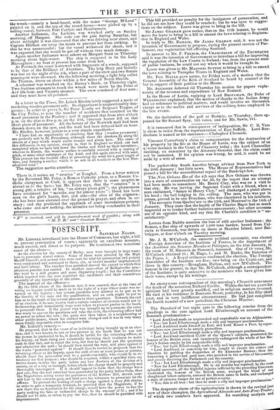POSTSCRIPT.
SATURDAY NIGHT. SATURDAY NIGHT.
Mr. LIDDELL introduced into the House of Commons, last night, a bill to prevent personation of voters ; apparently an excellent measure, much needed, and direct to its purpose. He mentioned two notorious cases of the abuse— At the election for the county of Derby, men were brought in large num- bers to personate absent voters. Some of these were arrested by the High Sheriff himself; and several who were sent for trial for personation and perjury were condemned and sentenced to three, six, or twelve months' imprisonment and hard labour. The number thus punished showed the extent to which this atrocious practice was carried. In another case—that of Belfast—the prac- tice went to a still greater and more disgusting length ; but the Committee which inquired into the case acquitted the candidates and their committees generally of any knowledge of the crime. The manner of the offence— By the 58th clause of the Reform Act, it was enacted, that at the time of voting no inquiry could be made as to the right of a man whose name was re- turned on the registry ; but certain questions were allowed to be put as to the identity of the man and the qualification, and an oath might be put to him as to the truth of his several answers to these questions. Towards the end of an election, it became known that a certain number of electors would not be forthcoming, and immediately steps were taken to present parties in the booth to personate them. If the person who was brought up to personate the voter was ready to answer the questions and take the oath, the returning-officer had no power to refuse the vote : the party was then taken to a neighbouring or other public-house, where his clothes were changed and it was in very many cases totally impossible even to recognize him.
Mr. Liddell's remedy— He proposed, that in the event of an individual being brought up at an elec- tion, and it was known to one or two persons in the booth that he was not the person he pretended to be, it should be lawful for the returning-officer, or his deputy, on their rising and voluntarily declaring their readiness to make oath to that fact, not to reject the vote, but that he should put the questions and administer the oath ; he should then record the vote, and place against it the words "protested against." It should then be lawful, he proposed, that the returning-officer or his deputy, upon the oath of one or more person or persons, should hand the personator over to a parish-constable, who should be in at- tendance for that purpose ; who should be required, within a specified time, say twelve hours, to take the party before any two Justices of the division of a county, or of a city or borough, before whom the charge should be properly and thoroughly investigated. If it should 'appear to them that the charge was a just one, that the real voter had been personated by the party before them, then the Magistrates, acting under the provisions of the Reform Bill, should com- mit him to the common gaol, and bind over the witnesses to prosecute for the offence. To prevent the making of such a charge against a bona fide elector, in order to gain a temporary triumph, he provided that the Magistrate, if he saw there was no foundation for the charge, should have the power to fine the party making the false or unfounded charge to the amount of 5/. ; and if he should not he able, or refuse to pay the fine, then he should be punished with imprisonment. This bill provided no penalty for the instigators of personation, and he did not see how they could be reached; but he was open to sugges- tions on the subject. Leave was given to bring in the bill.
-Sir JAMES GRAHAM gave notice, that on the 17th instant, he would move for leave to bring in a bill to amend the laws relating to Registra- tion in England and Wales.
In reply to Mr. BAILLIE, Sir JAMES GRAHAM said, it Has not the intention of Government to propose, during the present session of Par- liament, any registration-bill affecting Scotland.
In answer to Mr. F. FRENCH, the CHANCELLOR of the EXCHEQUER said it was the intention of Government to introduce a bill for improving the regulation of the Law Courts in Ireland; but, from the present state of public business, he could not say when it would be brought in.
Leave was given to Mr. MANNERS Surroti to bring in a bill to amend the laws relating to Turnpike Trusts in England and Wales.
Mr. Fox MAULE gave notice, for Friday next, of a motion that the General Assembly of the Kirk of Scotland be heard by counsel at the bar in support of their petition to the House.
Mr. AGLIONBY deferred till Thursday his motion for papers expla- natory of the revenue and expenditure of New Zealand.
In the House of Lords, replying to Lord BROUGHAM, the Duke of WELLINGTON explained, that the motion of thanks to the Indian Army had no reference to political matters, and would involve no discussion except as to the merits and services of the military force employed in the late events.


























 Previous page
Previous page